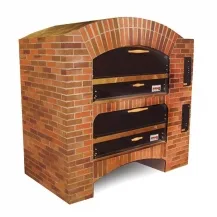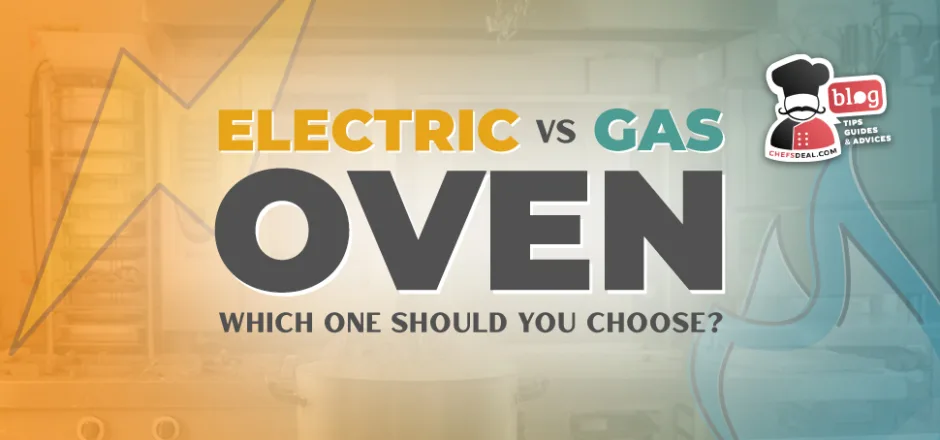One of the key questions to ask while purchasing a new commercial oven is whether to buy a gas or electric oven because it is a concern in all commercial kitchen equipment whether gas or electricity is better for the kitchen. Gas ovens provide moisture heat, which can bake faster, and electricity uses dry heat, which can provide crispness in desired dishes. Both have different pros and cons and may be better in different conditions, making a choice dependent on the availability of the source, menu substance and your personal preferences. In this article, you can review how electric vs. gas ovens function, the pros and cons of both types and what to look for when picking one.
What is a Gas Oven?

A gas oven is a kitchen cooking equipment utilizing natural gas or propane as the source. The spark or ignition generator inside the oven lights the gas to cook. They use radiation, convection, and conduction heat created by the burners within the oven to cook. Gas oven cavities are generally more open, letting the oven cool faster and venting combustible gases emitting moisture, making gas ovens ideal for baking and roasting, providing moist results. Gas ovens provide faster cooking and preheating than electric ovens.
Modern gas ovens, mostly with LPG or natural gas, can achieve high temperatures of up to 450°F (232.2°C). Some less modern versions may struggle to keep a steady cooking temperature, while modern commercial models function like wood-fired ovens.
What is an Electric Oven?

An electric oven is a kitchen cooking equipment operating with electricity, with the electric resistances placed in various parts of the cooking chamber generating the heat to cook food. These multiple heat resistances provide fast temperature rise and the ability to independently adjust the top and lower heat. There are also convection heat models, circulating hot air inside the chamber, providing more even cooking. Electric ovens can reach up to 500°F (260°C), depending on the model and type.
Since no open flame in electric ovens exists, no residue is derived from burns and combustion. Also, it is easier, more precise, and constant to control the temperature in electric ovens than in gas ovens. Electric ovens maintain constant heat better, saving significant energy in the long term. Electric ovens can be powered by a standard 120-volt outlet or a 240-volt circuit, depending on the model and size.
Electric vs. Gas Oven: What Are the Differences?
Both have advantages and disadvantages; electric and gas ovens have 5 main differences to consider before deciding which one suits your kitchen.
- Source availability: Electric ovens are generally convenient for most kitchens, but gas ovens require an available gas connection in the location of your business. This is the basic yet essential point to determine whether you can install an electric vs. gas oven.
- Cooktops: The cooktops of ovens are another point to determine whether you prefer a gas or electric stove. Gas stovetops are preferable thanks to their precise and easy temperature control. On the other hand, electric stovetops provide a more uniform heat distribution.
- Price: The initial costs don’t have a huge difference in electric vs. gas ovens when the only difference is the fuel source; the models and features affect the prices. Gas ovens have higher upfront costs, yet they have less running expenses since natural gas is cheaper than electricity and is more energy-efficient.
- Moisture: Electric ovens produce a dry heat, which creates crispiness and crunchiness on roasted food. Gas ovens release moisture, keeping the cakes and meats moist.
- Installation: Since dealing with gas has potential dangers, gas ovens must be installed by a professional, which means it is more costly to install a gas oven. If you have the required power outlet for an electric oven, it is quite easy to install an electric oven: all you need to do is plug it in.
Advantages of Gas Ovens

Gas ovens have 5 advantages that will give a better idea about where they can be more useful than electric ovens.
1. Moist Heat
Gas ovens generate more moisture and humid heat than electric, making them perfect for moist dishes such as meats, keeping them juicy, and other food cooked in sauces and broth.
2. Faster Preheating
The flames of a gas oven make it heat up faster than electric ovens, and the same when cooling down. Faster preheating times can reduce the cooking times; however, it is harder to maintain the temperature in gas ovens.
3. Less Running Costs
Gas ovens have more upfront costs than electric ovens, but since gas costs are less than electricity, It will be a more cost-efficient choice in the long term. This can be one of the main reasons for choosing a gas oven.
4. Standard Electrical Requirements
Most gas ovens require 110V electrical power, the standard of most kitchens, making it convenient for any kitchen.
5. Fewer Malfunctions
Gas ovens are efficient and easy to operate, consisting of three simple parts: the regulator, burner assembly with thermostat, and burner manifold. On the other hand, an electric oven is more prone to malfunctions, such as wires becoming brittle and not heating properly because of resistant heat.
Disadvantages of Gas Ovens
Gas ovens 2 disadvantages vs. electric ovens:
1. Not Precise Heat Control
Gas ovens don’t have an even heat distribution and precise temperature controls like electric ovens. This can lead to uneven results, but with a flame spreader, you can help to distribute heat evenly.
2. Less Safe
Equipment safety is advancing every day, but there is a risk of gas leaks and open flames in gas ovens. Be sure to have a carbon monoxide detector near the gas-utilizing equipment in your kitchen.

Advantages of Electric Ovens
There are 5 pros of electric ovens use:
1. Dry And Even Heat
Electric ovens provide a dryer heat than gas ovens, which is ideal for cooking crispy crusts for baked goods or meats. The dry heat of electric ovens is capable of broiling and roasting, providing crunchy and crispy results. Another advantage of electric ovens is the even distribution of the heat. The fans distribute the heated air throughout the chamber, ensuring even temperatures and results, which are great for baking cakes.
2. Less initial cost
Electric ovens have less upfront costs than gas ovens. This can be seen as an advantage for initial purchase, but depending on the place you live, electricity is generally more expensive than natural gas. It implies that the running costs of an electric oven will be more than those of a gas oven over time.
3. Precise temperature
Electric ovens provide more precise temperature control with less fluctuation than gas ovens. More precise control ensures even and consistent results, especially when baking goods.
4. Safety
Electricity is always safer to use when cooking than gas. The danger of gas leaks and other concerns, such as the release of possible carcinogens and greenhouse gasses when gas is used. Electricity is typically safer and more environmentally friendly.
5. Cleanliness
Electric ovens are easier to clean because they have burn residue derived from open flames. Most electric ovens have self-cleaning cycles, using high temperatures to ensure the cleansing of germs. Also, electric ovens without coils have smooth surfaces, which can be cleaned with a simple wipe, which is easier than cleaning the coils of a gas oven.
Disadvantages of Electric Ovens
There are 2 disadvantages of electric ovens to consider before purchasing:
1. Electrical Requirements
Electric ovens require a 220V power outlet, while most traditional kitchens have the standard 110V outlets. It will cost extra to make your kitchen 220V compatible, so make sure to have the proper power source before purchasing an electric oven.
To accommodate an electric oven, kitchen owners might need to upgrade their existing electrical systems. This upgrade involves installing new wiring and possibly new circuit breakers and requires professional electrical services, which adds to the overall cost. This additional expense can substantially burden businesses, particularly small or newly established ones.
2. Slower Preheating
Electric ovens utilize coils as the heating element, which takes more time to heat up and cool down to the right temperature. While gas ovens can reach the desired temperatures within 10-15 minutes, electric ovens take 20-30 minutes to preheat. But when the oven reaches the proper temperature, electric ovens maintain temperature better than gas ovens.
Conclusion
Choosing the right commercial oven for your commercial kitchen is a crucial decision that significantly impacts the quality and efficiency of your cooking processes. Electric vs. gas ovens have several advantages and disadvantages; for example, gas is a less expensive option, but still, it is not available everywhere, and electricity is more accessible but controlled by local utilities. Gas ovens provide moisture, which is ideal for baking, while the dry heat of electric ovens is great for roasting and broiling foods. Finally, the usefulness of an electric or gas oven is determined by your kitchen’s specific needs, the availability of energy sources, and your culinary tastes.






